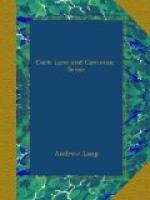This step may be naturally taken by those who conceive that the whole process of ghost and god-making is based on a mere set of natural and inevitable fallacies, and who decline to recognise that these progressive fallacies (if fallacies they are) may be steps on a divinely appointed road towards truth; that He led us by a way that we knew not, and a path we did not understand. Yet, of course, it is plain that a conclusion may be correct, although it was reached by erroneous processes. All scientific verities have been attained in this manner, by a gradual modification and improvement of inadequate working hypotheses, by the slow substitution of correctness for error. Thus monotheism and the doctrine of the soul may be in no worse case than the Copernican theory, or the theory of the circulation of the blood, or the Darwinian theory; itself the successor of innumerable savage guesses, conjectures of Empedocles, ideas of Cuvier, of the elder Darwin, of Lamarck, and of Chambers.
At present, of course, the theistic hypothesis, and the hypothesis of a soul, do not admit of scientific verification. The difficulty is to demonstrate that ‘mind’ may exist, and work, apart from ‘matter’. But it may conceivably become verifiable that the relations of ‘mind’ and ‘matter’ are, at all events, less obviously and immediately interdependent, that will and judgment are less closely and exclusively attached to physical organisms than modern science has believed. Now, according to the anthropological theory of the origin of religion, it was precisely from the opposite of the scientific belief,—it was from the belief that consciousness and will may be exerted apart from, at a distance from, the physical organism,—that the savage fallacies began, which ended, ex hypothesi, in monotheism, and in the doctrine of the soul. The savage, it is said, started from normal facts, which he misinterpreted. But suppose he started, not from normal facts alone, but also from abnormal facts,—from facts which science does not yet recognise at all,—then it is possible that the conclusions of the savage, though far too sweeping, and in parts undeniably erroneous, are yet, to a certain extent, not mistaken. He may have had ‘a sane spot in his mind,’ and a sane impulse may have led him into the right direction. Man may have faculties which savages recognise, and which physical science does not recognise. Man may be surrounded by agencies which savages exaggerate, and which science disregards altogether, and these faculties and agencies may point to an element of truth which is often cast aside as a survival of superstition, as the ‘after-image’ of an illusion.




